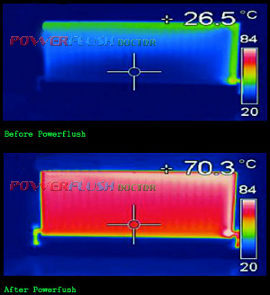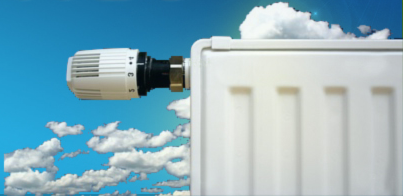New boiler warning

Boiler manufacturers insist that old heating system be thoroughly flushed before installing a new boiler and if not performed manufacturer warranty will usually be cancelled.
If you purchase a new boiler or new central heating radiators you should consider powerflushing because whilst your new boiler is in pristine condition it will soon be contaminated by sludge, rust and debris which are in your old heating system causing components failure or affecting performance of the system.
High efficiency modern boilers have very narrow passageways in the heat exchanger and are very sensitive to rust, sludge, scale and other debris which can cause blockage.
Only by powerflushing can you be sure that a system is clean to the standards demanded by modern boilers and heat exchangers.
Comparing powerflush to traditional method
The method of flushing by using chemical agents followed several days later by repeatedly draining down the central heating system is very labour intensive, it requires at least two visits and doesn’t get rid of all the debris and problems often quickly return.
No matter how good the flushing agent was, the low flow rate causes that some debris settle back in the system.
Removing individual radiators, and flushing them with a hose outside the house, is equally time consuming, very messy and has no effect on deposits in the pipe work and elsewhere in the system.
Because these methods are very time consuming and labour intensive, the cost of it will be passed on the total cost of new boiler installation. Installer will not do it for free, and system will not be completely clean!
Only powerflush can really clean your system.
Central Heating and Boilers
- installation, service, repair -


Symptoms
- The boiler or pump is noisy
- Combi boiler blocked heat exchanger, hot water demand - boiler fires up than goes off
- Reduced hot water temperature
- Boiler overheats or shuts off when hot water is needed
- The radiators have cold spots or not working
- It takes ages for the system to warm up
- Radiators need regular bleeding of accumulated air
- Evidence of sludge and rust in the system
- Pump failures
Coming soon
- powerflush training courses -
- we will share our expertise -how to powerflush boiler
how to powerflush radiators
how to unblock heat exchanger



 Corrosion inside circulatory pump causing pump failures and circulation problems.
Corrosion inside circulatory pump causing pump failures and circulation problems.
 Rust reduced the diverter valve diameter from 22mm to around 7mm severely reducing circulation.
Rust reduced the diverter valve diameter from 22mm to around 7mm severely reducing circulation.
 Inside the internal boiler component, dirt and rust causing boiler breakdowns.
Inside the internal boiler component, dirt and rust causing boiler breakdowns.










 filter
filter

 TF1
TF1

 MagnaBooster2
MagnaBooster2